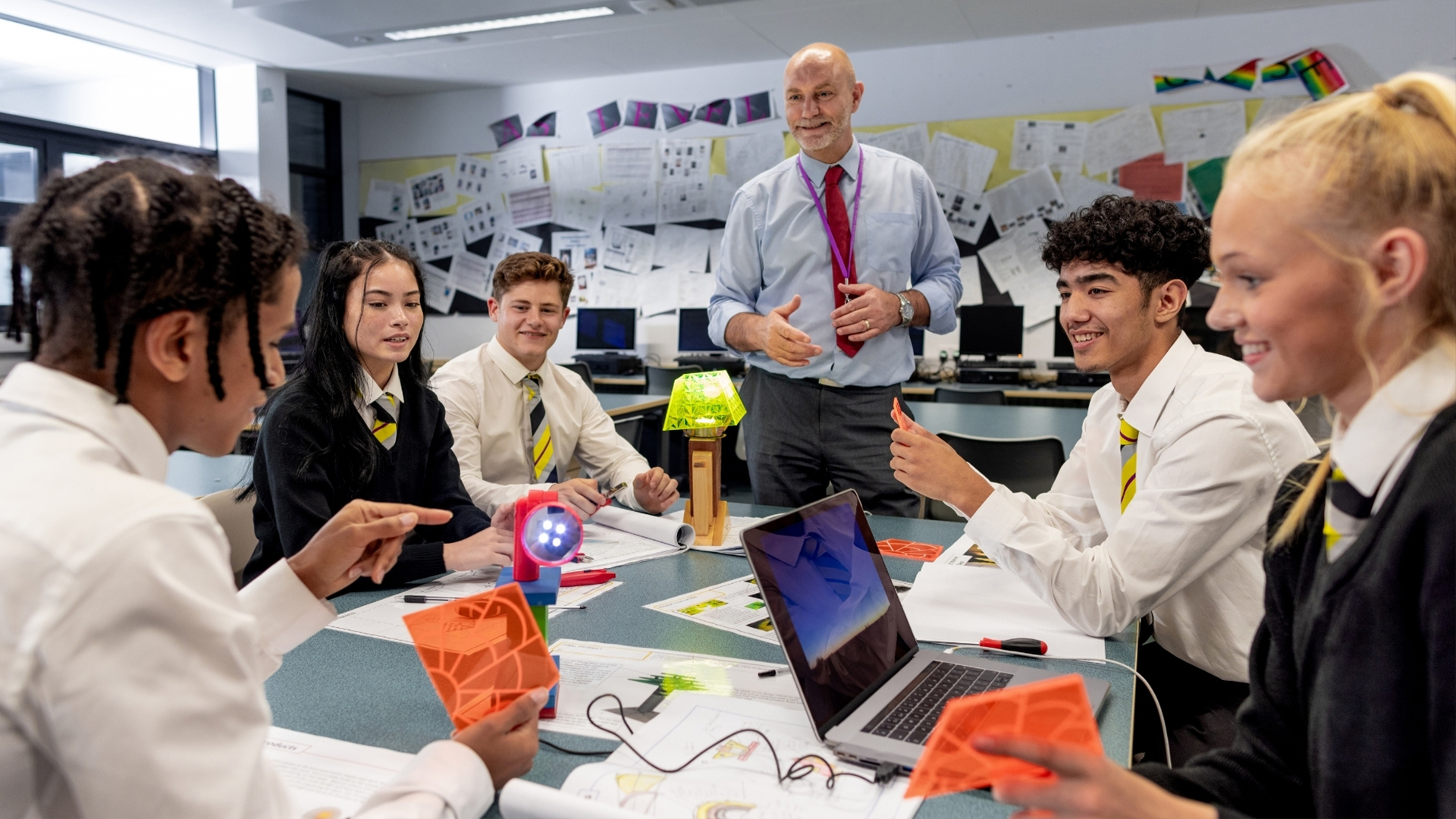Initial Teacher Training
Transform the future and lives of young children in your local community with our expert-led, in-school teacher training course across the North West.
What is Initial Teacher Training (ITT)?
Initial Teacher Training, or ITT, is a teacher training programme in which individuals achieve Qualified Teacher Status. Trainee teachers typically complete the course in 11 months; however, we also offer part-time courses that spans over 20 months.
The programme involves a combination of academic, theory-based studies and practical teaching within a school placement, equipping the trainee with the knowledge, skills and behaviours they need to be effective educators.
ITT is a crucial course for any aspiring primary and secondary school teachers.

What is Qualified Teacher Status?
Qualified Teacher Status (QTS) is a professional accreditation that formally recognises a trainee teacher has met the legal requirements to teach in state-funded schools across England.
Although QTS is technically not a mandatory requirement in all schools, it is generally preferred and is often a minimum requirement in state-funded and private schools.
QTS can also provide more career opportunities, potentially leading to higher pay scales.
Do all teachers need to complete an ITT course?
Yes, in most schools across England, you will need to complete an ITT course. The alternative route is to obtain a teaching-related degree from university. However, for many applicants, this is not a feasible option.
An ITT course is a different way to obtain the initial training required to become a qualified teacher without the need to go to university, which is why it is an appealing option for many career changers.
Apply to become a teacher today!
Can you train to be a teacher without a degree?
While you can train to teach without a degree, you will generally have to complete this through a Teacher Degree Apprenticeship (TDA).
However, to be accepted onto an ITT course, you will need a degree of 2:2 or higher. Your degree does not need to be teaching-related, but you will need to present your degree certificate when you apply for the course.
If you obtained your degree outside of the UK, you will need to apply an ENIC certificate from the UK National Information Centre, who are the official organisation for the recognition and comparison of international qualifications and skills.
What is the difference between SCITT and a PGCE?
A School-Centred Initial Teacher Training course (SCITT) and a Postgraduate Certificate in Education (PGCE) are both routes that enable you to obtain QTS, but they differ slightly in their approach.
SCITTs are school-oriented, meaning they rely heavily on practical in-school experience from day one. Whereas, a PGCE is typically university-led and includes a combination of both academic study and school placements. A PGCE will not provide you with as much in-school experience compared to an SCITT course.
When you learn with Forward as One, you will complete a SCITT that also includes a PGCE, providing you with the benefits of both routes!
Why choose Forward as One?
At Forward as One, our goal is not only to help young people reach their full potential, but for our trainees to continually progress their careers too, empowering you to flourish. We are a multi-academy trust with one team, one mission, one family at our heart.
As a prominent institution within the Forward as One trust, our Learn with FA1 hub stands at the forefront of educational excellence. Partnered with Ambition Institute, our Initial Teacher Training allows you to gain hands-on classroom experience, enabling you to start your career with confidence.
Once you have completed our ITT programme, you'll be known as an Early Career Teacher (ECT) for the next two years of teaching. During these two years, you will complete a mandatory Early Career Framework (ECF) induction programme, which you can complete with Forward as One. This programme is aimed at further developing your skills, knowledge and well-being, helping you to succeed and progress in your teaching career.
//www.youtube.com/embed/mZ7npGt8ZMQ#t=0.5
Teacher Training in the North West
At Forward as One, we have a wide number of fantastic partner schools located across the North West, including:
- Accrington
- Bolton
- Bury
- North Manchester
- Oldham
- Preston
- Radcliffe
- Rochdale
- South Ribble
- Tameside
If you can't see your location in the list above, don't worry! Simply get in touch with our team today to discuss where you're based and if any of our partner schools are local to you.
Train to Teach with Forward as One!
Can you get student finance while training to teach?
Yes, you can get student finance while you're training to teach. There are two types of student finance that you may be eligible for: tuition fee loans and maintenance loans.
- Tuition fees: You may be able to apply for a tuition fee loan to cover the costs of the ITT course, and if you're eligible, the amount you borrow will be paid directly to your training provider.
The maximum amount you can borrow for a tuition fee in the UK is: £9,790 per year for a full-time course and £7,335 per year for a part-time course. - Maintenance loans: Maintenance loans are designed to help cover living costs while you study. However, like tuition fees, there is a maximum amount that you may be able to borrow:
- £8,877 if you live at home with your parents
- £10,544 if you live away from home and are studying outside of London
- £13,762 if you live away from home and are studying in London
- £4,461 if you're 60 years or over on the first day of the first academic year of your course
You can head over to the Government website and use their handy student finance checker to get an estimate of how much funding you could get.
What is a teacher training bursary?
A teacher training bursary is a tax-free sum of money that is offered by the UK government to encourage talented individuals to pursue teaching careers in specific subjects.
Unfortunately, bursaries are not available for Primary courses, and the bursary amount for Secondary will vary depending on which subject you choose to teach. If you have a 1st, 2:1, 2:2 or master’s degree or a PhD, you may be eligible for a bursary.
Secondary bursaries for 2026/2027 include:
- £29,000 in chemistry, computing, mathematics and physics
- £20,000 in design and technology and languages (including ancient languages)
- £5,000 in biology and geography
Is there an age limit on becoming a teacher?
No, there is no age limit on becoming a teacher, and many successful teachers have started their teaching career later in life.
While many trainee teachers start their teaching journey straight after university, mature students and career changers are also welcomed into the industry and are often valued for their life experience and diverse perspectives that they bring.
Applying to become a teacher
To apply to become a teacher, there are a few criteria that must be met.
Before you apply for an ITT course, you must have the following:
- A minimum of grade C/4 in GCSE English, Maths and Science OR an equivalency test
- A university degree with honours OR equivalent
- Proof of right to work in the UK
- ENIC certificates for those with international qualifications
- Two references, including professional and personal
- Your work history
The application process
Listed below is the process you will need to take to be accepted into the course:
- Apply to the course- When applications open, you can register with us and complete Ambition Institute's short application form. This should only take around 10 minutes to complete.
- Attend an interview- Once your application has been passed over to us by Ambition, we will review your application. If we think you would be a good fit for the course, we will offer you an interview, either in person at one of our interview venues or virtually.
The interview will include the following:
- Two tasks for you to complete and for our interviewer to observe
- A short, structured interview
We will also ask you to bring your personal documents outlined above so we can verify your application and eligibility for the course. - Accept your offer- If you are successful at the interview, we will send you a conditional offer. The conditions of the offer are based on you completing Ambition Institute's pre-programme checks, such as obtaining your degree certificate and a DBS.
Ready to apply?
Please Download our Teaching prospectus and read our Frequently Asked Questions first.
If you have any questions about the course, please don't hesitate to get in touch with our expert team.
Frequently asked questions:
Who are Ambition Institute?
Ambition Institute is a national educational charity, providing training and professional development based on the most rigorous research and evidence about what works to shape the future of education.
Their programmes are designed to equip educators to tackle the challenges they face. Ambition Institute's approach is based on sound evidence of what works, providing practical tools to make an even bigger impact in the classroom and across the school. They firmly believe in ensuring we #KeepGettingBetter.
How much do newly qualified teachers get paid?
In England, teachers will earn a minimum and maximum starting salary depending on the location:
- England, excluding London: £31,650 - £49,084
- London fringe: £33,075 - £50,471
- Outer London: £36,413 - £53,994
- Inner London: £38,766 - £60,092
As a teacher, you will also be entitled to a substantial pension, generous holidays and annual salary reviews, with most teachers moving up the pay range on an annual basis.

